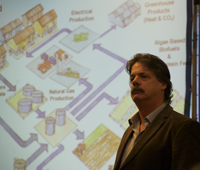Mike McCloskey, D.V.M., may be a name you are familiar with. Or another name, Fair Oaks Farms, might ring a bell. Whether or not those are familiar, you should know that Mike McCloskey is the president and owner of Fair Oaks Farms, a farm run by the Bos, den Dulk, McCloskey, Schakel, and Van Ravenswaay families.
 The group's dairy interests run outside of Fair Oaks Farms, and the Fair Oaks Dairy Adventure (a tour through one free stall barn at their 30,000-cow complex in northwest Indiana), including a big dip into renewable energy.
The group's dairy interests run outside of Fair Oaks Farms, and the Fair Oaks Dairy Adventure (a tour through one free stall barn at their 30,000-cow complex in northwest Indiana), including a big dip into renewable energy.
McCloskey: Natural gas is our future fuel
McCloskey was on hand at last week's AgStar conference. AgStar is an organization that promotes anaerobic digestion (and a partnership of the Enivornmental Protection Agency, Department of Energy, and United States Department of Agriculture).
McCloskey also serves as the chairman of the Dairy Innovation Center's Sustainability Council. Within that role, he oversees progress on anerobic digestion in dairy, including one project at his own Fair Oaks Farms. As we reported in Hoard's Dairyman (page 554, September 10, 2011 issue), Fair Oaks teamed with Ruan Transportatation Management Systems and T. Boone Pickens, Jr., to create milk trucks that run completely on natural gas. The goal is to use compressed natural gas, made by anaerobic digesters at Fair Oaks Farms. Hopefully that part of the plan will be complete by July.
McCloskey showed the map his trucks must take to fill up. There is a station at Fair Oaks Farms in Indiana. Their trucks also haul milk into Kentucky and Tennessee. So another station was built at the Kentucky/Indiana State line. He admits that it's been a good bet for the farm so far, but they're only trying to produce 100 percent of their electricity – nothing more.
While compressed natural gas looks to be a good fit at Fair Oaks Farms through at least the year 2017 (due to the EPA's Renewable Identification Numbers – "RINs" which oil companies must buy), McCloskey said he expects 20 percent of all U.S. trucks will be using some form natural gas as fuel within five years. He thinks the economics are sending the industry that way, so it may be a good time for more digesters to start making CNG, rather than electricity.
McCloskey talks about some sustainability at Fair Oaks Farms in a video at this link: http://dairy2020.usdairy.com/video/62.

McCloskey: Natural gas is our future fuel
McCloskey was on hand at last week's AgStar conference. AgStar is an organization that promotes anaerobic digestion (and a partnership of the Enivornmental Protection Agency, Department of Energy, and United States Department of Agriculture).
McCloskey also serves as the chairman of the Dairy Innovation Center's Sustainability Council. Within that role, he oversees progress on anerobic digestion in dairy, including one project at his own Fair Oaks Farms. As we reported in Hoard's Dairyman (page 554, September 10, 2011 issue), Fair Oaks teamed with Ruan Transportatation Management Systems and T. Boone Pickens, Jr., to create milk trucks that run completely on natural gas. The goal is to use compressed natural gas, made by anaerobic digesters at Fair Oaks Farms. Hopefully that part of the plan will be complete by July.
McCloskey showed the map his trucks must take to fill up. There is a station at Fair Oaks Farms in Indiana. Their trucks also haul milk into Kentucky and Tennessee. So another station was built at the Kentucky/Indiana State line. He admits that it's been a good bet for the farm so far, but they're only trying to produce 100 percent of their electricity – nothing more.
While compressed natural gas looks to be a good fit at Fair Oaks Farms through at least the year 2017 (due to the EPA's Renewable Identification Numbers – "RINs" which oil companies must buy), McCloskey said he expects 20 percent of all U.S. trucks will be using some form natural gas as fuel within five years. He thinks the economics are sending the industry that way, so it may be a good time for more digesters to start making CNG, rather than electricity.
McCloskey talks about some sustainability at Fair Oaks Farms in a video at this link: http://dairy2020.usdairy.com/video/62.









